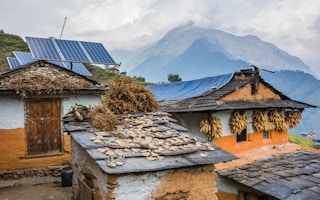The IKEA Foundation and the Rockefeller Foundation yesterday announced that they will join forces to set up a US$1 billion global initiative to drive investment in distributed renewables and fight energy poverty in developing nations around the world. It will be the single largest distributed renewable energy fund to date.
The platform, which will launch this year, aims to bring distributed clean energy to one billion people this decade, with the long-term goal to deliver clean power to 800 million people who currently lack electricity, and a further 2.8 billion with unreliable access.
Renewable energy investment is rising fast and hit US$303.5 billion in 2020, up 2 per cent from the previous year. But many organisations continue to struggle to identify viable, investment-ready clean energy ventures, the foundations said.
By channeling development finance to the expansion of projects at scale, the new initiative aims to act as a catalyst for further investment in distributed renewables across Sub-Saharan Africa, South and Southeast Asia, Latin American, and the Caribbean.
The foundations estimate that up to US$20 billion in additional capital can be unlocked by 2030 to help emerging economies leapfrog polluting electricity sources and transform the livelihoods of communities in the world’s remotest corners.
Data by the International Energy Agency (IEA), a Paris-based intergovernmental organisation, shows that more than 10 per cent of the global population still lacks energy access, although electrification efforts have borne fruit. The number of people without access to electricity fell from almost 860 million in 2018 to 770 million in 2019, a record low in recent years.
In developing Asia, almost 1.2 billion people have gained access to electricity since 2000, with 96 percent of the region having access to electricity in 2019. India accounts for around two-third of this progress. In Africa, the number of people gaining power access annually doubled from 9 million a year between 2000 and 2013 to 20 million people between 2014 and 2019, outpacing population growth.
However, past progress has been partly reversed in the wake of the Covid-19 pandemic. In Sub-Saharan Africa, for instance, the number of people without electricity access has steadily declined since 2013 but is expected to have increased since the pandemic began.
Per Heggenes, chief executive officer of the IKEA Foundation, a Dutch charitable organisation started by the furniture firm’s founder Ingvar Kamprad in 1982, said: “If global energy consumption doesn’t change from fossil fuels to renewable energy, we will not meet the Paris Agreement ambitions and millions of families will be left behind in poverty. We need to be honest and recognise that the current approach is not delivering the impact the world needs in the time that we have.”
“Millions of lives and trillions of dollars have been lost to Covid-19, forcing people back into poverty after decades of progress. The effects of the climate crisis will make this even worse, which is why we must invest now to reverse this downward spiral,” said Dr. Rajiv J. Shah, president of the Rockefeller Foundation.
To facilitate the joint investment, the United States-based foundation will incubate the new initiative in RF Catalytic Capital, another platform it launched in 2020 to offer an innovative way for impact investors, and governments to combine their resources and expand their global philanthropic reach in an effort to help the world equitably recover from the Covid-19 pandemic.
Distributed renewable energy is electricity generated near the point of use rather than through centralised sources like power plants. It is usually deployed in off-grid electricity distribution networks that are not connected to the main grid.
Flip Dötsch, who handles strategic communications at IKEA Foundation, told Eco-Business that the new platform would collaborate with partners in recipient countries to implement its projects.
But he did not reveal whether the initiative would set aside money to deal with challenges such as the need for local skills-building to ensure that energy facilities are properly maintained and operated in the long run.
The International Renewable Energy Agency (IRENA), an intergovernmental organisation, estimates that the global energy transition in the power sector alone will require investment of nearly US$22.5 trillion in new renewable installed capacity through 2050, implying at least a doubling of annual investments compared to current levels.

















